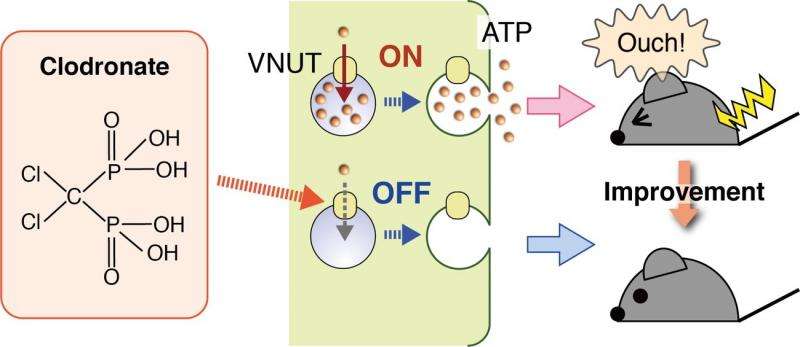Potential drug for treating chronic pain with few side effects

Researchers at Okayama University describe in the Proceedings of the National Academy of Sciences the effect of clodronate on the regulation of adenosine triphosphate release and its potential as a drug for the treatment of chronic pain. The compound has few side effects and may also be effective for treating other medical conditions including diabetes.
Typical drugs for treating chronic pain—a condition estimated to affect 20 to 25 percent of the world's population—often cause serious side effects such as stomach problems, kidney failure or addiction. Now, a team of researchers led by Yuri Kato and Takaaki Miyaji from Okayama University has identified a compound, clodronate, that inhibits the mechanism triggering chronic pain while producing few side effects. Clodronate may therefore be used for future chronic pain drug development. Moreover, the researchers reckon it may also be effective for the treatment of other diseases such as diabetes and neurological disorders.
Acute pain is the result of sensory nerves responding to a (potentially) harmful stimulus, a biological process called nociception. However, inflammation or nerve injuries can trigger pathological nociception—a long-lasting sensation of pain due to the stimulated production of adenosine triphosphate (ATP) molecules that bind to so-called purinergic receptors causing pain responses. The ATP molecules participating in the purinergic signalling processes are carried by vesicular nucleotide transporter (VNUT) protein. Since it is known that suppression of VNUT function leads to an improvement of neuropathological conditions in mice, Moriyama and Miyaji and colleagues looked for a VNUT inhibitor with few side effects.
The researchers tested clodronate, a molecule belonging to the class of bisphosphonates, compounds used for treating osteoporosis. Clodronate does not contain nitrogen, a characteristic known to decrease therapeutic effect for osteoporosis and the number of side effects. Experiments on proteoliposomes showed that clodronate is a potent inhibitor of VNUT, whereas injections of clodronate in wild-type mice showed that it attenuated chronic neuropathic and inflammatory pain.
The scientists confirmed that clodronate has few side effects, and noted that its therapeutic effectiveness is stronger than that of other widespread drugs for neuropathic pain. Clodronate's potent inhibition of VNUT also makes it a highly relevant candidate drug for the treatment of diabetic symptoms. Given that clodronate is currently clinically approved in many countries for the treatment of osteoporosis, the drug has great potential. Accordingly, Kato and Miyaji and colleagues conclude their report by noting that "further studies regarding the wide range of applications of clodronate are currently in progress in our laboratories."
Chronic pain
In medicine, pain lasting a long time—typically, three months or more—is called chronic, as opposed to acute pain. Chronic pain can be neuropathic, when the nervous system is damaged, or nociceptive, when inflammation causes nociceptors (pain sensors) to be triggered permanently.
Current drugs for the treatment of chronic pain, notably opioids like morphine, have various side effects, including stomach or kidney dysfunction, drug addiction, drowsiness and vomiting. Yuri Kato and Takaaki Miyaji and colleagues have now identified a potential non-opioid drug, clodronate, that suppresses chronic pain by inhibiting the release of adenosine triphosphate (ATP), a mechanism involved in chronic pain.
Purinergic signalling
In living organisms, purinergic signalling is a way of passing on signals outside cells. It involves purines, particular types of aromatic molecules containing nitrogen, and so-called purinergic receptors in cells. The purinergic signalling mechanism associated with chronic pain involves the purine adenosine triphosphate (ATP), a molecule playing an important role in biological energy transfer processes; ATP is carried by vesicular nucleotide transporter (VNUT) protein. The present study shows that clodronate inhibits VNUT, which in turn attenuates neuropathic and nociceptive pain. Since clodronate has few side effects and since it has already been clinically approved in many countries, it is a promising drug for the treatment of chronic pain.
More information: Yuri Kato et al. Identification of a vesicular ATP release inhibitor for the treatment of neuropathic and inflammatory pain, Proceedings of the National Academy of Sciences (2017). DOI: 10.1073/pnas.1704847114

















